In business today, to attract more customers and build your brand, you must first create an image of success and authority. Most customers tend to be more comfortable doing business with businesses that they trust to meet their expectations. If you portray your business as profitable, most customers will believe that you can deliver what they need.
The same goes for corporate events; if you want your event/fundraiser/non-profit to attract more people, one way to do so is by working with successful brands. Working with big brands will, in most cases, help you increase your audience, as most people already relate to those brands. However, it is not always enough to attract big brands to make an event successful; there are various things that must be done when preparing for an event that require money and, at times, lots of it. You have to secure the venue, pay the event planners, pay the delivery persons, and set everything up for the event.
At times you may not have all the cash needed to set up your event, in which case sending a sponsorship letter may come in handy. Through donations from sponsors, you could be able to set up your event just as you may have envisioned it. By creating a platform for your sponsors to push their brand, they may be more willing to sponsor your event if they believe in your cause.
What is a Sponsorship Letter?
A sponsorship letter is a letter that is written to a business or individual to ask them to contribute to an event, a fundraising initiative, or offer long-term support to a non-profit organization. The letter is usually written when a business is trying to solicit funding or in-kind donations towards a specific cause.
The sponsorship letter should be written in a way that encourages your sponsor to sponsor your cause, clearly stating to them why it is worth sponsoring that cause. The letter must also elucidate the key benefits that the sponsor will be getting from sponsoring that event. The letter should be sent out to prospective sponsors as soon as one has established their budget incentive levels. This will afford the sponsors enough time to consider your sponsorship proposals and make their donations.
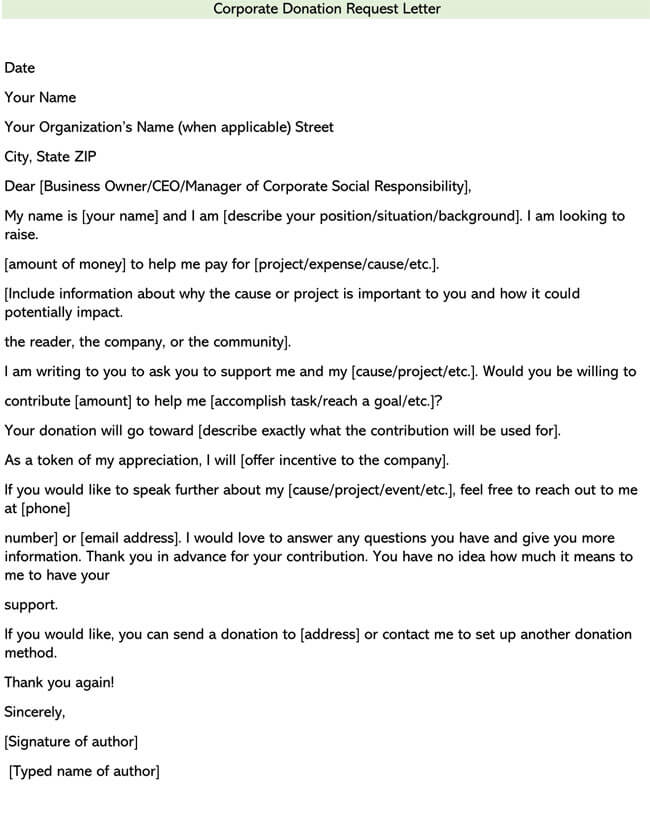
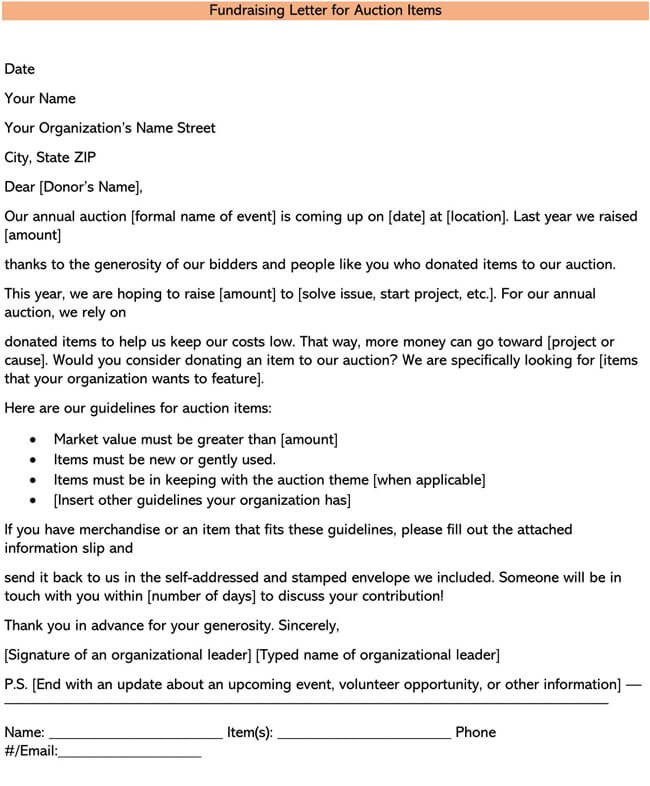
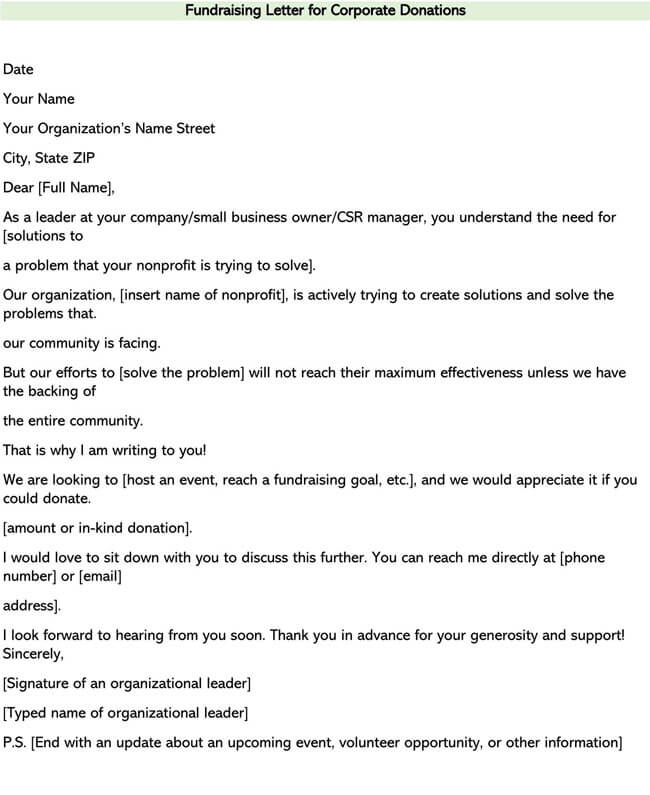
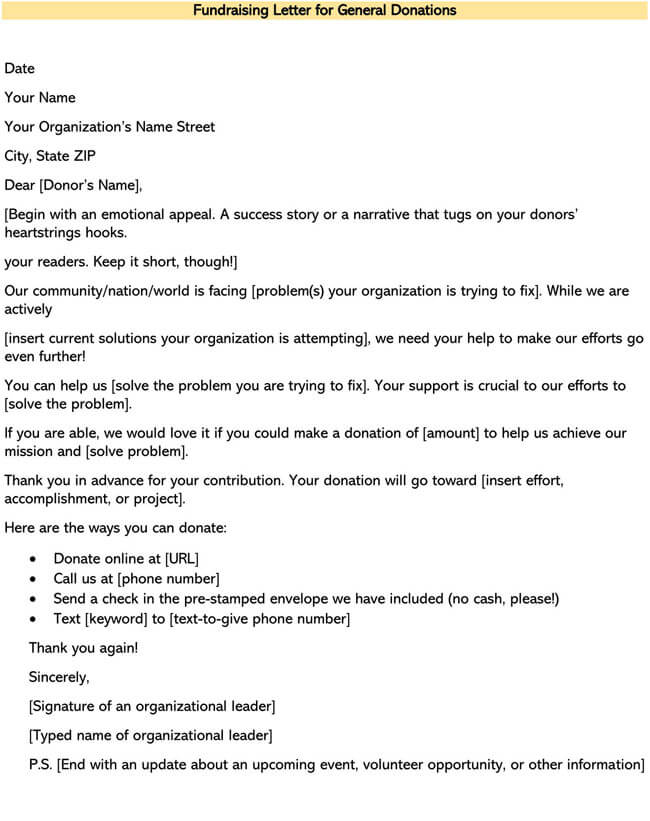
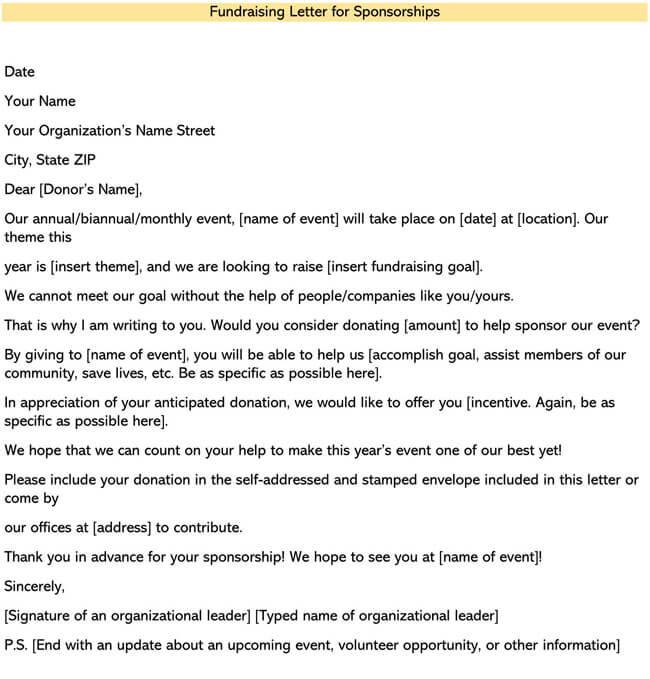
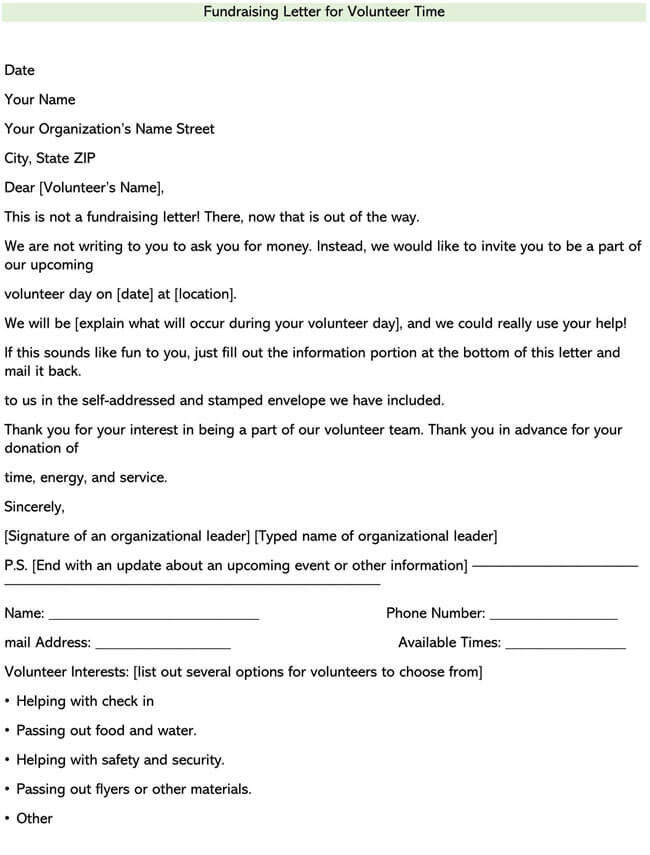

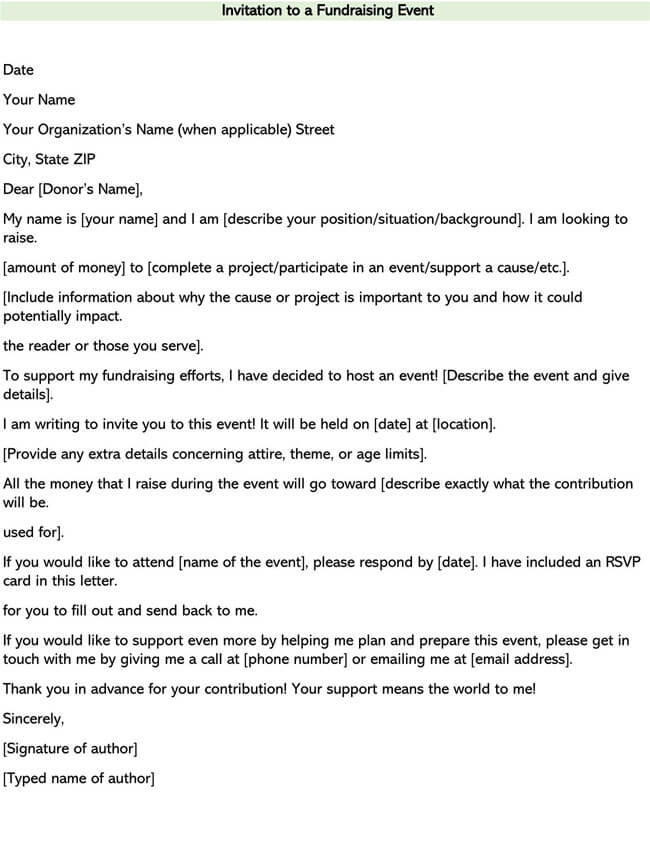
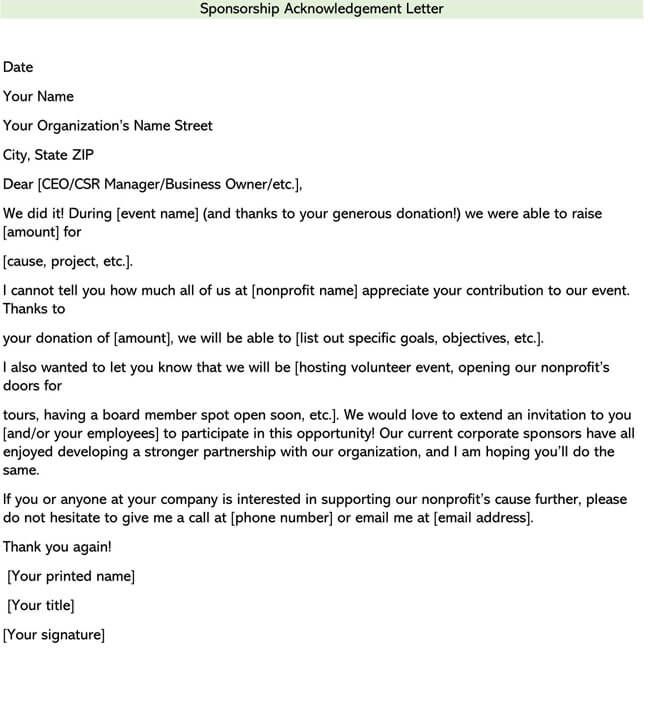
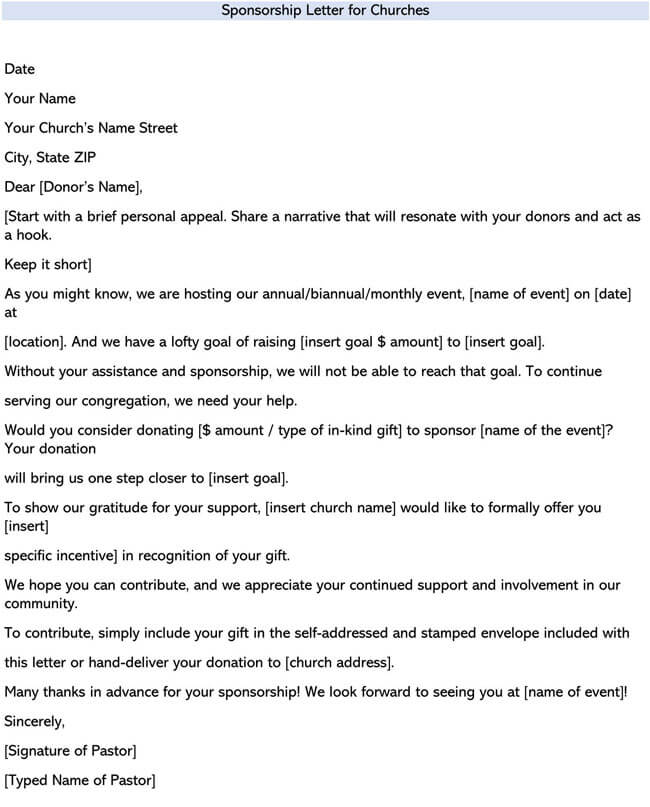

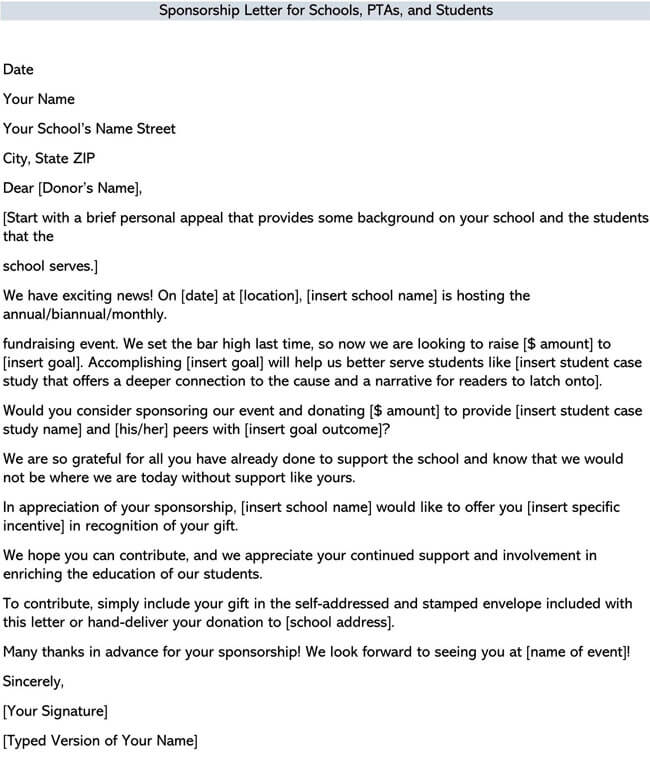
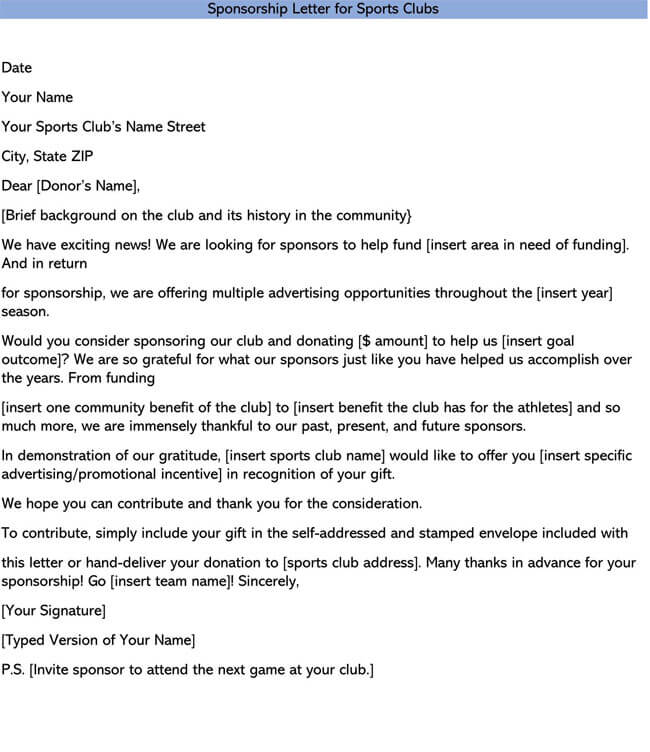
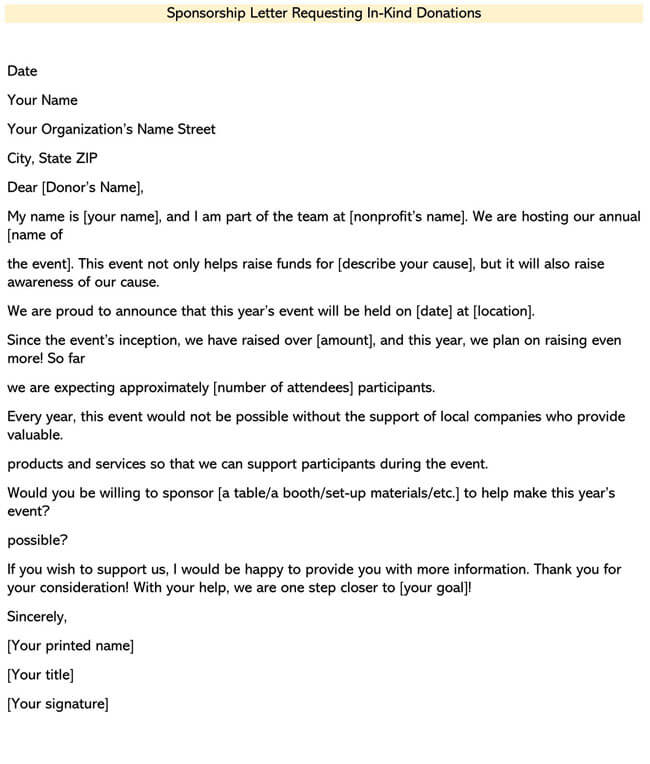
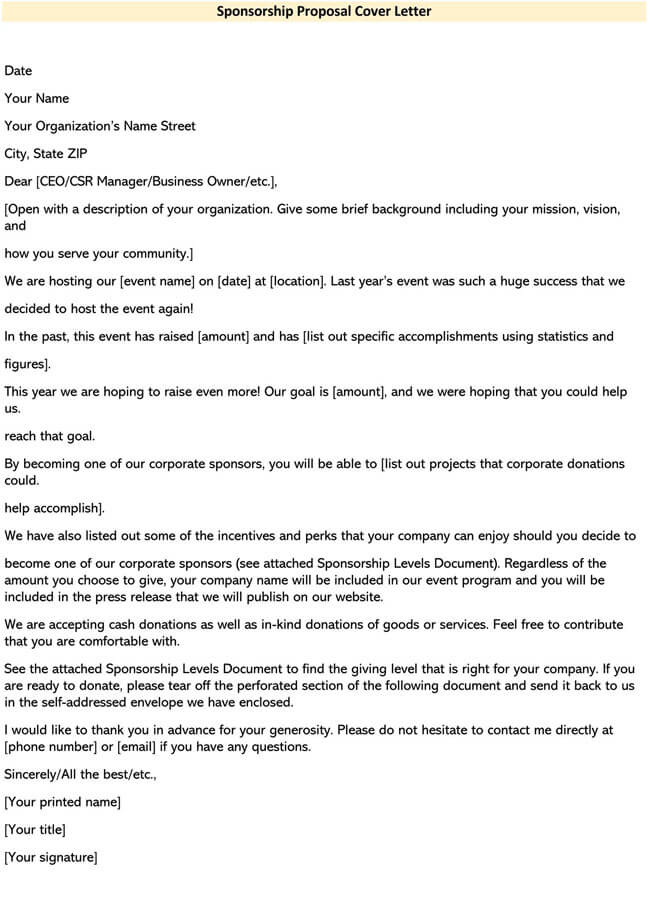
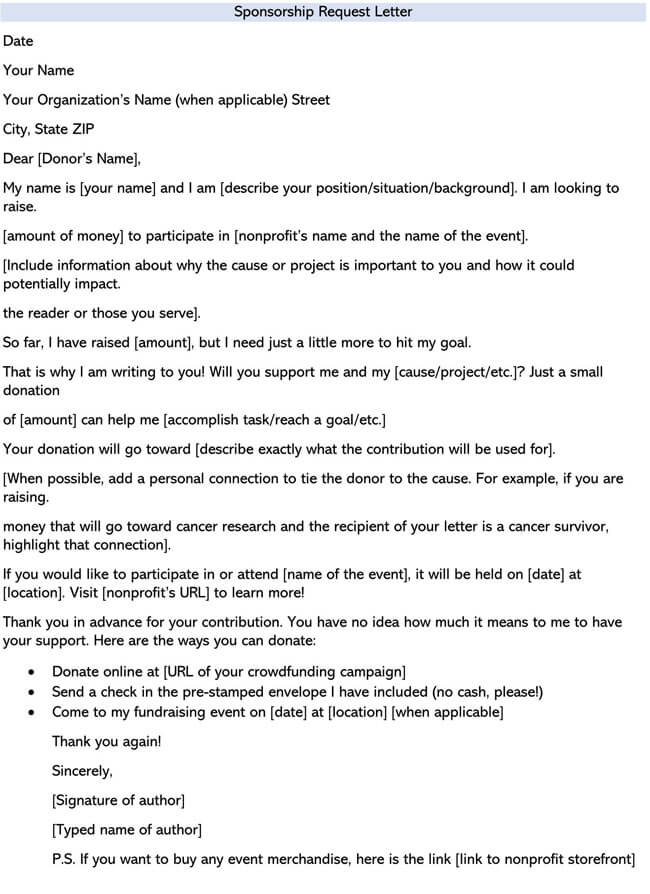
When to Use a Sponsorship Letter
There are various instances that warrant the use of a sponsorship letter, including:
- When you are sourcing funding for your event,
- When you are looking to host a fundraiser,
- When you are running a non-profit organization,
- When you are looking to continue your studies,
Elements of a Sponsorship Letter
Before you can approach your potential sponsors with your proposal, it is important to first understand the key elements that you must include in your letter:
- A short introduction to yourself: Introduce yourself or your organization, i.e., who you are, and what you do. The introduction part of your sponsorship proposal should be short- it should only describe who you are in a sentence or two.
- A brief idea of your opportunity: What are you looking to achieve with the sponsorship? What are some of the direct benefits that you can realistically promise the sponsor by partnering with your event? Your sponsorship letter should paint a clear picture of what you are looking to do with the sponsorship and should also state what the sponsors stand to get by sponsoring you, your event, or your organization.
- The reason why you contacted them: The letter should be clear and direct to the point. State why you are contacting the sponsor. Make it clear to them that you are writing to request that they offer their sponsorship. State why you reached out to them specifically for the sponsorship.
- Brief information about your audience: Do you have an idea of who your target audience is and how they overlap with the sponsor’s target audience? If not, then you should start by analyzing the target audience to help you determine the sponsors to target with your proposal.
- When you will follow up: After sending your proposal: It is important to always follow up to make sure that they did receive it. Make sure to mention when you will follow up and what method you will use i.e., phone call, email, or physical visit to their office.
Free Sponsorship Letter Template
[Your Name or Organization’s Name]
[Your Address or Organization’s Address]
[City, State, Zip]
[Your Email or Organization’s Email]
[Your Phone Number or Organization’s Phone Number]
[Date]
[Recipient’s Name or Company’s Name]
[Recipient’s Title or Company’s Department]
[Company’s Address]
[City, State, Zip]
Dear [Recipient’s Name or Company’s Name],
I am writing to you on behalf of [Your Organization’s Name or Your Event’s Name], a [brief description of your organization or event, e.g., non-profit organization dedicated to environmental conservation, annual community cultural festival, etc.]. We are currently seeking sponsorship for [specific event or project, e.g., our upcoming charity run, the annual youth arts program, etc.], scheduled to be held on [date of the event or duration of the project].
[Your Organization’s Name or Your Event’s Name] has been [brief history or achievements of the organization or event, e.g., successfully running for X years, recognized for its impact in a specific area, etc.]. Our mission is to [briefly describe the mission or goal of your organization or event, e.g., support underprivileged children, promote local arts, etc.].
We believe that a partnership with [Recipient’s Company Name] would be mutually beneficial, aligning with your company’s values of [mention values or initiatives of the company that align with your event, e.g., community engagement, environmental responsibility, supporting the arts, etc.]. As a sponsor, your company would gain [mention the benefits for the sponsor, e.g., exposure to a new audience, association with a valuable community cause, media coverage, etc.].
We are seeking [specify the type of support you are looking for, e.g., financial contributions, in-kind donations, services, etc.], which will be pivotal in the success of [your event or project]. In return, we offer [mention the specific benefits for the sponsor, e.g., logo placement on promotional materials, recognition during the event, complimentary tickets, etc.].
We would be honored to have [Recipient’s Company Name] as one of our esteemed sponsors. Enclosed with this letter, you will find a detailed sponsorship proposal, outlining the various levels of sponsorship and the corresponding benefits.
We would be happy to discuss this proposal in more detail at your earliest convenience and explore how we can form a fruitful partnership. Thank you for considering our request. We look forward to the possibility of working together for the success of [Your Event or Project Name].
Sincerely,
[Your Name]
[Your Position, if applicable]
[Your Organization’s Name, if applicable]
Sample Sponsorship Request Letters
Sample 01: Sponsorship Request Letter for Fundraising
Dear Ms. Johnson,
I am reaching out on behalf of Graceful Hearts Foundation, a charity dedicated to providing educational resources and support to underprivileged children in our community. We are excited to announce our upcoming event, the “Annual Charity Gala for Education,” scheduled for June 15, 20XX, and we are seeking your support.
For over a decade, the Graceful Hearts Foundation has been at the forefront of making a significant difference in the lives of countless children. Our annual gala is not just an event; it’s a celebration of hope and a testament to the power of community support in changing lives.
We believe that Bright Future Enterprises, with its long-standing commitment to community development and education, would be an ideal partner for this event. Your sponsorship would not only aid in the success of the gala but also align perfectly with your company’s values of empowering future generations.
We are seeking financial contributions to help cover the costs of the event and ensure that all proceeds can directly benefit our educational programs. In return, we offer substantial visibility for Bright Future Enterprises. This includes prominent logo placement on all event materials, a dedicated acknowledgment during the gala, and the opportunity to feature your company in our event press releases and social media channels.
Enclosed with this letter, you will find a detailed sponsorship proposal that outlines various levels of support and the corresponding recognition opportunities. We hope that you will consider one of these sponsorship packages, though we are also open to discussing any custom arrangements that might better suit Bright Future Enterprises.
We would be delighted to arrange a meeting to discuss this proposal further and explore how we can collaborate on this exciting event. Thank you for considering our request. We look forward to the possibility of partnering with Bright Future Enterprises to make a lasting impact in the lives of children in need.
Warm regards,
[Signature]
Jessica Miller
Event Coordinator
Graceful Hearts Foundation
jessica.miller@gracefulhearts.org
(555) 123-4567
Sample 02: Sponsorship Request Letter for Event Hosting
Dear Mr. Turner,
Greetings from the Innovative Minds Tech Conference! I am Daniel Roberts, the Event Director, and I am reaching out to discuss an exciting opportunity for FutureTech Solutions to play a pivotal role in shaping the future of technology. We are gearing up for our annual tech conference, scheduled for September 10-12, 20XX, and we believe FutureTech Solutions would be the perfect headline sponsor for this event.
Our conference brings together the brightest minds in technology, offering a platform for sharing groundbreaking ideas and fostering collaborations. This year, we expect over 5,000 attendees, including industry leaders, tech enthusiasts, and media representatives.
The synergy between FutureTech Solutions’ mission to drive technological innovation and our conference’s theme, “Embracing the Digital Future,” is undeniable. Your sponsorship would not only elevate the event but also position FutureTech Solutions at the forefront of the tech community.
We are seeking a headline sponsor to help us deliver an exceptional experience to our attendees. This partnership would provide FutureTech Solutions with extensive exposure, including:
- Your logo featured in all event promotions and materials.
- A keynote speaking slot for a representative from FutureTech Solutions.
- Exclusive branding opportunities at the event venue.
- Complimentary VIP passes and exhibition space.
We are confident that this collaboration will yield significant benefits for FutureTech Solutions, including enhanced brand visibility, networking opportunities, and direct engagement with a tech-savvy audience.
I have attached a detailed sponsorship proposal for your review, outlining the various benefits and sponsorship tiers. I would be thrilled to discuss how we can tailor a sponsorship package that aligns with FutureTech Solutions’ goals and expectations.
Thank you for considering this opportunity. I am looking forward to the possibility of partnering with FutureTech Solutions to create an unforgettable tech conference experience. Please feel free to reach out to me directly to schedule a meeting or to discuss any questions you may have.
Best regards,
Daniel Roberts
Event Director
Innovative Minds Tech Conference
daniel.roberts@innovativemindstech.com
(555) 678-9012
Things to Avoid in a Sponsorship Letter
When writing a sponsorship letter, there are various things that you may want to avoid in your letter so that it may turn out to be as efficiently prepared as possible.
Such as:
- Specific financial help: As much as you are requesting the sponsor to help you financially, do not mention how much you want them to contribute. Simply state what you are doing and how they can help you achieve what you are doing.
- Sponsorship grids and levels: Although you may be tempted to include levels or grids in your letter, it is important to avoid them. Setting a grid or level may deter the sponsor from helping you out with the little they have.
- Asking for free products: Do not ask to be given free gifts. Mention some ways in which you will be returning the favor that they are doing for you, such as setting up booths for them, mentioning them in your event, displaying their advertisements, advertising their brand in your campaign, etc.
- Pictures of your stakeholders: Do not include a picture of your stakeholders in your sponsorship proposal. Your stakeholders may have a positive or negative influence on the sponsor. They may see one or two people that they wouldn’t like to associate with, thereby not sponsoring your event.
- Focusing just on your need: Do not make the letter all about you. Don’t be too self-centered and forget to mention some of the ways in which the sponsor will benefit.
- Asking for a signature or contract: Do not ask the potential sponsor to sign a contract before they have even read your letter. Give them time to go through your letter and determine if they are interested in sponsoring you.
Best Practices for a Sponsorship Letter
When you are looking to get a sponsor for your event, it is important to start off on the same ground. How do you know the sponsor? Who introduced you to the? Have you met them before? If you were referred by someone close to them or someone that they’ve worked with before, it is important to mention it in your letter. After you have established some form of connection with the potential sponsor, draft a letter and address it to them specifically. Do not draft one letter and send it to multiple prospective sponsors. It is important to analyze each prospective sponsor individually and determine the common areas that you have before drafting the letter.
When writing the letter, you want to make sure that you have captured all the right information in your sponsorship letter, -especially the information on your target audience. The sponsor will most definitely want to know how your target audience blends with what they are doing. So, make sure that you don’t forget to include it in your letter.
note
Don’t include any unnecessary information in your letter. Only include what you believe is essentially important to the sponsor.
After sending the letter follow up with them. Sponsors usually get hundreds of letters every day. It is important to follow up after sending your letter to make sure that they received it and to get their feedback on your proposal.
When Not to Send a Sponsorship Letter
Convincing someone to give you money is always hard. It is even harder when you are meeting them for the first time. If you don’t have any connection with the sponsor, sending a sponsorship letter may be in vain, as they will, in most cases, reply to those whom they have previously worked with or already have some form of connection with.
Another instance of not sending a sponsorship letter is when you have forgotten the audience data: when you don’t have enough information about your audience, writing a sponsorship proposal may be in vain. The sponsor will want to know they will benefit from your audience. Make sure that you have enough information about your audience before drafting your proposal.
Lastly, you should not send a sponsorship letter when you don’t have enough time: It is always recommended to send your sponsorship proposal a month o two to your event. This will give the sponsors enough time to review your proposal and also give you enough time to follow up with them.
Frequently Asked Questions
A sponsorship letter should be short, i.e., one page in length. The sponsor is more likely to read through your proposal if it is short and direct.
You should start your proposal by properly introducing yourself- who you are, what you do, and why you are writing the letter.
The best way to ask a company to sponsor you is by finding out a common area where your event lines up with what the company is doing- how they will benefit from your event—and then drafting a great sponsorship proposal to pitch them your idea.
Your sponsorship proposal can make a difference in whether you will be able to land a sponsorship or not. Making sure that everything is well captured in your proposal is very important. Whether you are looking for a sponsor for your personal cause, event, fundraising, or even education, it is important that you craft a great sponsorship letter, one that will convince the sponsor that their cash will be put to good use.




